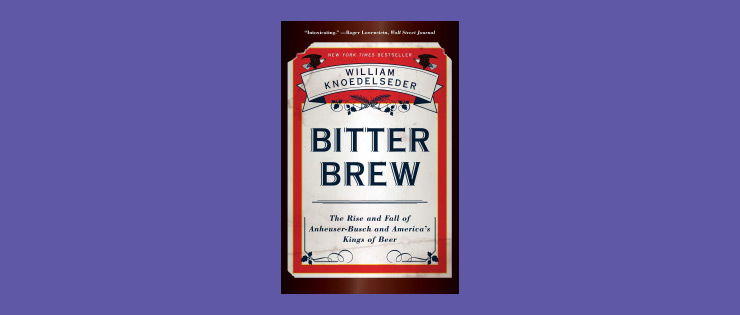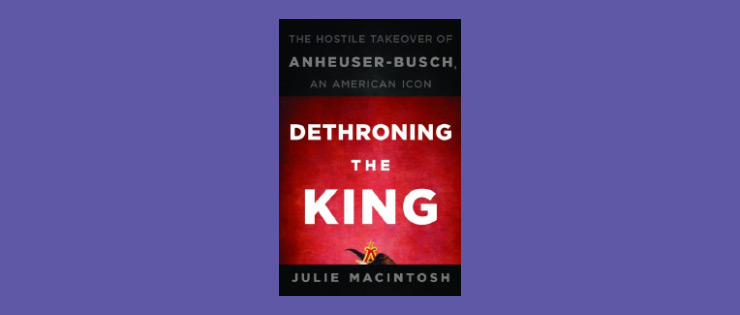Portfolio manager’s Letter March – April 2013
Bitter Brew and Dethroning the King
Two good books have been written that cover in detail the acquisition of Anheuser-Busch by AmBev. They are “Bitter Brew” by William Knoedelseder, and “Dethroning the King” by Julie MacIntosh, who is a journalist for the Financial Times. I would recommend “Bitter Brew” and “Dethroning the King” to anyone with an interest in investment business studies. Together, “Bitter Brew” and “Dethroning the King” tell an important story about the growth and corruption of a great American Business.
“Bitter Brew” and “Dethroning the King” cover an important acquisition, but more than that, they describe a really good story with lots of plot twists and many interesting characters, five generations of nepotism punctuated with serial philandering, bitter divorce, substance abuse, gun mishaps, and untimely deaths. This is a story that details many of the ways to build a wonderful business and then screw it up.

“Bitter Brew” and “Dethroning the King” give clues as to the reason Warren Buffett has joined the Brazilians in his acquisition of Heinz. These are essentially the same people that built AmBev before it became AB InBev. Upon the arrival of the Brazilians at Anheuser-Busch, after the completion of the $52 billion buyout, the restructuring was complete, swift and merciless.
Busch executives got their first hint of the new management style three days after the merger agreement was announced when their new CEO Carlos Brito flew into St. Louis on a commercial flight and booked a room at the Holliday Inn. Not only did Busch executives not fly commercial, but many of their wives had not been on a commercial flight in years.

Brito arrived in St. Louis in November of 2008 at the height of financial crisis, and before long InBev had announced the buyouts and retirements of 1000 upper level employees and management, together with layoffs of 1400 additional lower level employees. Also assigned to history were most of the employee perks and private offices. The new management took a sledge hammer to the expensively furnished private offices on the fifth floor of Anheuser-Busch’s headquarters and replaced them with one large open room with tightly packed desks and long tables.
Also gone were 1200 Blackberries, free tickets to Cardinal games and free beer for employees. InBev eliminated $1.5 billion in annual expenses sold Busch’s theme parks for $2.6 billion and rapidly reduced AB InBev’s debt from $56.6 billion in 2008 to $30.1 billion at the end of 2012. When the restructuring was complete only three senior level Anheuser-Busch managers remained.
Bitter Brew – August III
August Busch III is both the hero and the antihero of the “Bitter Brew” story. He built the Budweiser brand into one of the best known in the world. He was a universally feared workaholic who had a tendency to behave as a king ruling with absolute power. In his 27 years at the top of Anheuser-Busch, he built the company’s share of the American beer market from 28% to 54%, an incredible market share for a simple consumer product in a very competitive market.
“The Third” as August III was called, was a fierce competitor, and the company became very profitable under his direction. This success allowed the company to build in a very expensive life style. In addition to his undeniable business skills, The Third had inherited the family’s taste for expensive perks (he flew his personal helicopter to work every day in order to avoid St. Louis traffic). For the length of his reign from the palace in St. Louis he ruled over a court of well-paid vice presidents who oversaw not only the beer business, but also the Busch Gardens theme parks in Virginia and in Florida. It was a first-class operation all the way.
There was a fleet of Dassault Falcon corporate jets with a staff of 20 waiting pilots. $1,000 dinners, bullet proof Escalades with drivers, hunting lodges, sky suites at Busch Stadium. Every refrigerator at corporate headquarters, on the corporate jets or in the homes of the executives, was well stocked with free Bud, Bud Lite and Michelob.
While the company’s life style made it vulnerable to a takeover by a well-managed cost cutter like AmBev, this was not The Third’s biggest mistake – that mistake was that he ignored the globalization trend that was going on in the beverage business in the 1990s. If he had been aggressively expanding in Europe during the nineties it might have been Budweiser that acquired AmBev in 2007.
The fate of Anheuser-Busch is what results when a company coasts on its reputation and ignores global markets. Despite its reputation as an all American business idol, Anheuser-Busch by 2007 proved to be a decaying family dynasty unable to compete on the world stage.
The idiot that eventually arrived on the scene was “The Third’s” son August IV, or “The Fourth”, who became CEO in 2006. He was not really an idiot; he just had a strong tendency to act like one. The Fourth’s definition of fun included lots of booze, babes, fast cars and drugs. MacIntosh does not mention the drugs in her book but in “Bitter Brew”, Knoedelseder quotes associates who claimed that “The Fourth” showed up stoned at various business meetings and social functions.
Knoedelseder in “Bitter Brew” also describes (but MacIntosh ignores) incidents “Fourth’s” life in which two of his girlfriends died. One in an auto accident when August IV was driving her home from college party (an incident very neatly covered up by daddy). The other was a drug related death in his home after the merger was completed (again daddy intervened to hush the incident up).
Bitter Brew – Grupo Modelo
The Fourth had been CEO a little over one year when he received the buyout offer from AmBev. His defense was to pursue a buyout the Mexican brewer Grupo Modelo. A plan that, if it had completed, would have made AB too expensive because AmBev would not have been able raise enough money to buy the company that resulted from a merger of Modelo and Anheuser-Busch merger.
The Company’s Lawyers and Bankers worked around the clock for several weeks to hammer out the details of a merger with Modelo, and when they finally managed to work out an agreement that was acceptable to the managements of both companies. Senior management in St. Louis started to celebrate, but when the agreement was presented to the Anheuser-Busch board, August III vetoed it.
We do not know his motivation for backing out, but back out he did. There is the suggestion that his decision was to simply to take his money and run, but is likely that there was more to it than that. Perhaps there was the fear that he had not left the company in the best of hands, and so accepting the AmBev offer was for him an easy way out of a bad situation.
A judgment of the Busch Family mentioned in “Bitter Brew” and “Dethroning the King” was that, the father and son were known around headquarters as “Crazy and Lazy”. Contrast this mention in “Bitter Brew” to the management philosophy of the new AB-InBev CEO Brito, from an interview he gave at the Stanford Graduate School of Business:
“success of a corporation hinges on hiring high-performing individuals, who bring passion and commitment to the job, and on building a company culture that keeps them.”
Plenty of corporate CEOs say they want employees who know how to have fun. But Brito, describing the demanding corporate culture he maintains, admits he doesn’t even like the word.
“I think fun’s too weak. … I have fun at the beach with my kids,” said Brito MBA ’89.
“I like people at the company to have fun, sure, plus passion, plus commitment, plus energy, plus lots of other things. Fun is too weak if you want to be best at what we do.”
While “Bitter Brew” story offers an object lesson in how success can spoil a really good business, it is not tragedy, at least if you were in a management position at Anheuser Busch. A few of the former princes of St. Louis feel they have be victimized by the Brazilians, but these victims walked away with enough money from their stock holding to substantially lessen the pain from their loss of power. August III received $427 million, Patrick Stokes, a longtime assistant to August III and CEO 2002 – 2006, received $160 million, August IV $91 million.
Upper level managers received $80 – $100 million and many lower level managers had stock worth $10 million and up. The real victims were the lower level employees who had no stock options, and the city of St. Louis. The management at AmBev is in no way responsible for that eventual outcome. The “Bitter Brew” story ended the way it did because senior management at Anheuser-Busch became a little too insular and a little too fond of their perks.
Blog Archive
